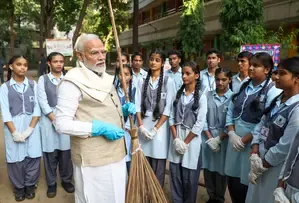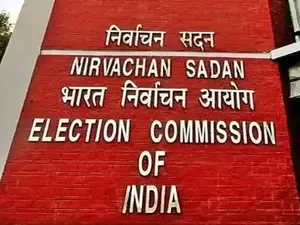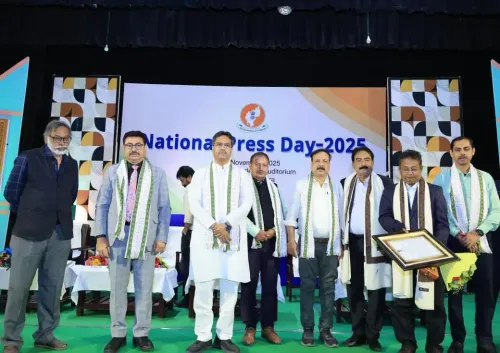How Did the Swachh Bharat Mission Change National Attitudes Toward Cleanliness?

Synopsis
Key Takeaways
- Swachh Bharat Mission aims for a cleaner and healthier India.
- Empowers women through improved sanitation access.
- Has achieved 100% Open Defecation Free status in less than a decade.
- Promotes solid waste management and recycling.
- Recognized globally for its success in public health.
New Delhi, Oct 1 (NationPress) The Father of the Nation, Mahatma Gandhi, who led India to its political freedom, foresaw the importance of sanitation long before many. He famously stated, ‘Sanitation is more important than independence’. For Gandhi, a genuinely liberated India was not only politically independent but also socially aware, where hygiene and dignity coexist.
Sadly, these profound insights by Gandhi were often overlooked by various governments throughout India’s independent history, leaving his vision of a clean and healthy nation unfulfilled for many years.
The realignment of these principles came to light when Prime Minister Narendra Modi honored Gandhi's legacy on his 145th birth anniversary by launching the Swachh Bharat Abhiyan (Clean India Mission) on October 2, 2014.
This initiative stands as the world’s largest national behavioral transformation program focused on sanitation, establishing PM Modi as a leader in people-driven sustainable development.
Swachh Bharat Mission Signals a New Era of Governance and Civic Duty:
Effective sanitation and hygiene are crucial not just for health but also for dignity. The ancient Indus Valley Civilisation acknowledged this by implementing advanced sewage and drainage systems, a wisdom that has faded over time. For years, India projected an image of spiritual wealth marred by poor public hygiene, characterized by littered streets and open defecation, alongside a lack of awareness regarding hygiene.
Cleanliness was typically viewed as a governmental obligation, while citizens neglected its impact on health and quality of life. In a mere 11 years, Modi has ushered in a significant transformation of India’s sanitation landscape through the Swachh Bharat Abhiyan, embedding cleanliness into the national ethos.
For the first time in independent India’s history, cleanliness and hygiene have become central to governance, reflecting a significant shift in national priorities. The extensive toilet construction initiatives have created jobs for over 1.25 crore individuals, while about 5,000 clean-tech start-ups showcase burgeoning opportunities for the youth.
The mission also promotes solid waste management, recycling, and minimizing plastic usage, turning sanitation into both a social responsibility and an economic catalyst.
Bharat’s Sanitation Revolution:
From having half the population practicing open defecation to achieving a 100% Open Defecation Free (ODF) status in under a decade, India has made remarkable strides. Prior to 2014, around 100 million rural and 10 million urban households lacked sanitary toilets, and over 564 million people, nearly half the population, still engaged in open defecation.
Since the launch of the SBA, India has reached a groundbreaking milestone in its sanitation journey, achieving 100% ODF status in both urban and rural sectors in less than a decade.
According to government records, over 12 crore toilets have been built across the country by September 2025, ensuring access to sanitation facilities and saving countless lives.
During the COVID-19 pandemic, the effects of SBM became evident; its focus on toilets, handwashing, and waste management played a vital role in controlling infections and managing biomedical waste, proving that cleanliness has become a fundamental aspect of the national mindset.
Women at the Core of India’s Sanitation Revolution: Ensuring Health, Safety, and Dignity:
SBM has significantly improved women’s hygiene, health, safety, and dignity. The absence of toilets previously compelled women, particularly in rural areas, to defecate in the open, exposing them to health hazards and threats.
A 2020 study indicated that 96% of rural women were content with household toilets, noting enhanced safety, privacy for menstrual hygiene, convenience, and reduced health risks. SBM has also tackled gender imbalances by providing gender-specific latrines in schools and public areas, thereby increasing girls’ school enrollment and overall health standards. Women are not simply beneficiaries but agents of change; initiatives like ‘Rani Mistris’ have trained women as masons, empowering them with skills, confidence, and leadership roles. Many have now assumed positions in local governance, illustrating that empowering women bolsters entire communities.
From Diarrhea to Dignity: Swachh Bharat Mission Saves 3 Lakh Children’s Lives:
For children, the future of our nation and advocates for change, access to clean and safe toilets is crucial; it profoundly influences their health and future. An open defecation-free environment decreases diarrhea, a leading cause of death among children under five, and reduces malnutrition.
According to the World Health report, approximately 3 lakh children have been saved from sanitation-related diseases, significantly lowering child mortality rates and enhancing quality of life. Research from the International Food Policy Research Institute, University of California, and Ohio State University estimates that SBM saves 60,000–70,000 children annually.
Global Recognition:
Today, SBM is recognized globally as a benchmark for public health and is hailed by the United Nations as the largest and most effective sanitation initiative, contributing to the SDGs. A UNICEF survey revealed that investing in a toilet saves families about Rs 50,000 annually. For spearheading this transformation, the PM was awarded the Global Goalkeeper Award from the Gates Foundation in 2019. SBM has inspired global initiatives like Nigeria’s Clean Nigeria Campaign and influenced international sanitation policies through the four Ps—political leadership, public financing, partnerships, and community involvement—emphasized at the Mahatma Gandhi International Sanitation Convention in 2018.
Pilgrimage as a Model of Sustainability:
The 2025 Amarnath Yatra exemplified sustainability under SBM Urban 2.0, introducing a zero-landfill, plastic-free system and managing 11.67 metric tons of waste daily with 1,300 ‘SafaiMitras’. Eco-friendly bags replaced single-use plastics, sanitation was enhanced with 1,600 mobile toilets, and comprehensive faecal sludge treatment was implemented, with over 70,000 pilgrims participating in the Green Pledge, establishing a new standard for zero-waste pilgrimages.
Suggestions:
Integrate Cleanliness into School Education: Schools can serve as change agents; educating children on the significance of handwashing, toilet usage, and waste management, can empower them to bring this knowledge home, affecting families and communities and fostering enduring behavioral change.
Cleanliness Social Internships for Youth: Involve young people in public hygiene initiatives to nurture accountability and community awareness.
Social Service as Punishment for Sanitation Violators: Drawing inspiration from foreign nations that penalize litterers, India could implement a system combining fines with community service for offenders.
Fix Accountability for Food Establishments: Ensure cleanliness in the vicinity of kitchens and dining areas. Upholding the principle of ‘Cleanliness is next to Godliness’, SBM has emerged as a global model for public health while promoting the UN SDG goals. Through behavior change, leadership, and community engagement, SBM is creating a cleaner, safer, healthier, and more prosperous India, realizing Gandhi’s vision of Swachh Bharat and paving the way for a developed Bharat by 2047.
(The author is Pro Chancellor, Chandigarh University. himani.sood@cumail.in)









